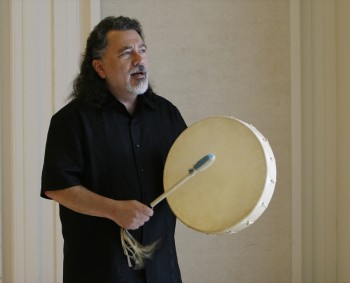Curt Cacioppo's Latest Premiered By ‘Rock Star of Chamber Music'

Ruth Marshall McGill Professor of Music Curt Cacioppo
Details
Curt Cacioppo, Ruth Marshall McGill Professor of Music, had an extraordinary spring break. The composer flew to Tucson to attend the world premiere of his string quartet,“Kinaaldá,” at the Arizona Friends of Chamber Music Festival. As if that weren't exciting enough, his piece was premiered by the Borromeo String Quartet, the artists-in-residence at New England Conservatory and a group that one classical music blog called “the rock star of chamber music.”
“I was amazed at how well-prepared the quartet was,” says Cacioppo.“It's not always like that… They had a conception of the piece. They understood how it went. And they were very much interested in the inspiration behind it.”
“Kinaaldá” is the final installation in a cycle of four quartets, "Womb of the Sacred Mountains," that tells the creation myth of the Navajo Indians. It's setting is the Southwest, so its Arizona premiere held special significance for the composer. Cacioppo, a basefall fan, even worked in a sly reference to Jacoby Elsbury, the first Native American of Navajo descent to play in the major leagues.“One of the principal musical motifs in the quartet spells the name Jacoby Ellsbury,” says Cacioppo.“He plays for the Boston Red Sox and the Borromeo… are big Red Sox fans. Especially the second violinist, Kristopher Tong, he was really into the Jacoby Ellsbury connection.”
This world premiere was not the first time that Cacioppo worked with members of the famed string quartet. First violinist Nick Kitchen played recitals and toured with pianist Cacioppo in the late 1980s and early 1990s, and even did a teaching stint here at Haverford. Aside from their stellar musicianship, the quartet has gained notice (most recently in a New York Times article) for using laptops instead of sheet music to follow the full score as they play.
Cacioppo was impressed with not just their performance of his piece, but also their intensity of rehearsal for it.“I went a day early [to the festival], and we worked together for about three or four hours,” he says.“But the first thing they did was play the piece for me. They played it straight through. And with them and the amount of preparation they did, it was like hearing a polished performance. As soon as they finished I said, ‘That was a take.' We could've used that for a CD release.”
Cacioppo reports positive responses from the audiences in Tucson (there was an open dress rehearsal in the morning that was free for the community), and the Borromeo liked the piece so much that they've added it to their repertoire.“Every time we finished playing it, they would say, ‘It's beautiful. It's beautiful,'” says Cacioppo.“And they just wanted to play it more and more. And so they are.” The Borromeo have already scheduled performances of “Kinaaldá” for the Taos School of Music's Festival on June 19 and the Philadelphia Chamber Music Society on December 18 and are exploring further opportunities through the Copeland House and the Peabody Essex Museum of Salem.
The Borromeo premiere performance of“Kinaaldá” will appear on the upcoming Navona Records release of Cacioppo's work that is due out later this year. The album will also include an orchestral piece,“Scenes From Indian Country,” and "Wolf," a piece for soprano, cello and piano, which is based on an American Indian poem. Cacioppo also hopes to program a performance of all four quartets in his cycle next fall.“It'll be like a little festival of my own,” he says.
Until then, he'll be content with the satisfaction of a well-received world premiere.“It was great to be out there,” he says,“and to have this experience with [the Borromeo]."
-- Rebecca Raber



